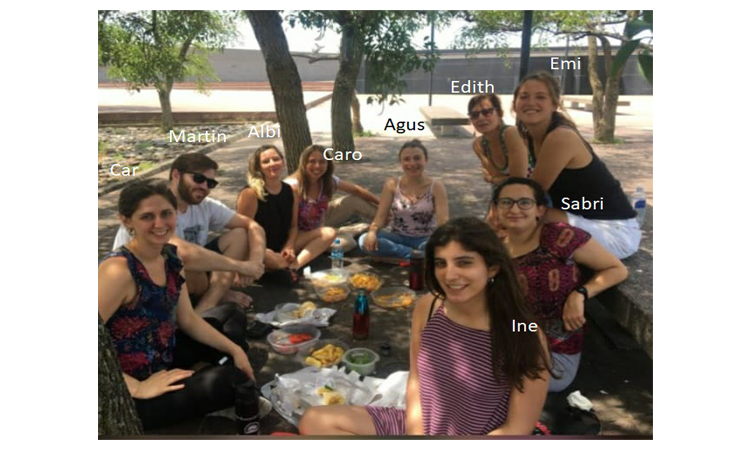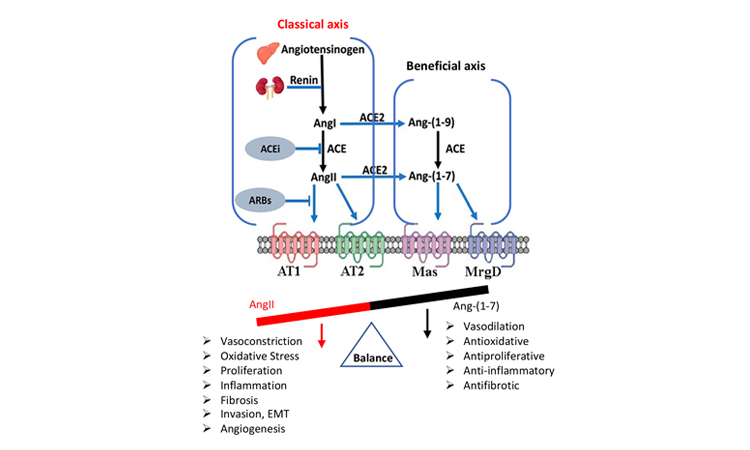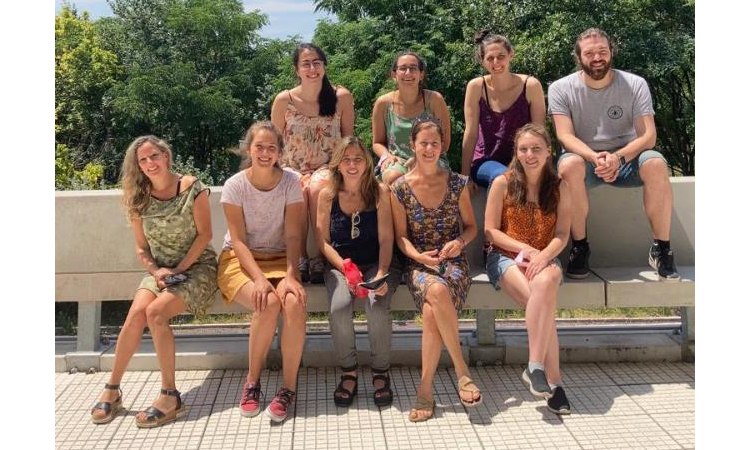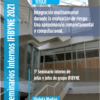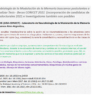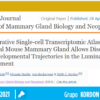
Sistema renina angiotensina en la glándula mamaria normal y tumoral / Renin angiotensin system in normal and tumor mammary gland
Dra. Carolina Schere-Levy
Investigadora Independiente CONICET
DIRECTORA DE PROYECTO / PROJECT LEADER
carolinaschere@gmail.com
Línea de Investigación:
La angiotensina II (AngII), el péptido efector más importante del RAS (“Renin Angiotensin System”), es un factor de crecimiento pro-inflamatorio involucrado en la regulación de la progresión tumoral, como la estimulación de la migración, la metástasis y la angiogénesis, estimulando la producción de VEGF. La Angiotensina 1-7 [Ang-(1-7)] es un péptido biológicamente activo, generado principalmente a partir de la AngII mediante clivaje por la enzima convertidora de angiotensina II (ACE2). Nuestro grupo de trabajo estudia el rol del RAS en la glándula mamaria normal y tumoral. Hemos demostrado que los componentes del RAS operan en el control de eventos clave del desarrollo normal de la glándula mamaria, como en el período de involución post-lactancia. Además, demostramos que la (Ang-(1-7) contrarresta efectos metastásicos en células tumorales mamarias triple negativas. Actualmente estamos enfocados en descifrar la interacción entre la señalización de VEGF y el eje benigno del RAS (ACE2/Ang-(1-7) en el control de la capacidad metastásica de células mamarias tumorales triple negativas.
Angiotensin II (AngII), the most important effector peptide of the RAS (“Renin Angiotensin System”), is a pro-inflammatory growth factor involved in the regulation of tumor progression, such as the stimulation of migration, metastasis and angiogenesis, stimulating the production of VEGF. Angiotensin 1-7 [Ang-(1-7)] is a biologically active peptide, generated mainly from AngII through cleavage by angiotensin II converting enzyme (ACE2). Our group studies the role of RAS in normal and tumor mammary gland. We have shown that RAS components operate in the control of key events of normal mammary gland development, such as during the post-lactation involution phase. Furthermore, we demonstrate that (Ang-(1-7) counteracts metastatic effects in triple-negative breast tumor cells. We are currently focused on deciphering the interaction between VEGF signaling and the benign RAS axis (ACE2/Ang-(1-7) in the control of the metastatic capacity of triple negative breast cancer tumor models.
Para prevenir metástasis, se han probado medicamentos que bloquean ciertas vías de señalización, como la desencadenada por el factor endotelial vascular (VEGF), regulador maestro de la formación de vasos sanguíneos (angiogénesis). La señalización del VEGF está involucrada tanto en el crecimiento del tumor como en la propagación metastásica. Se ha observado que la resistencia al tratamiento desarrollada por el uso de estos compuestos es un factor crucial en el éxito del tratamiento, ya que los beneficios suelen ser transitorios y los pacientes recaen con metástasis.
Nuestro grupo en colaboración con el Dr. Thomas Walther de la Universidad de Berlín (Alemania), tenemos una estrecha colaboración desde hace varios años. En su laboratorio, se ha demostrado en cáncer de riñón que la inhibición de la actividad de VEGFR provoca una disminución significativa de la expresión de ACE2 postulando un nuevo mecanismo de resistencia a este tratamiento: aquí el agregado de Ang-(1-7) a la terapia anti-angiogénica revierte los efectos no deseados y produce un beneficio anti-tumoral. Nuestro proyecto propone descifrar cómo las células tumorales adquieren capacidad metastásica bajo tratamientos anti-VEGF. Investigamos si la administración de Ang-(1-7) junto con inhibidores de la señalización de VEGF inhibe la propagación metastásica en modelos tumorales mamarios triple negativos.
To prevent metastasis, drugs that block certain signaling pathways have been tested, such as that triggered by vascular endothelial factor (VEGF), a master regulator of blood vessel formation (angiogenesis). VEGF signaling is involved in both tumor growth and metastatic spread. It has been observed that the treatment resistance developed by the use of these compounds is a crucial factor in the success of the treatment, since the benefits are usually transitory and patients relapse with metastases.
Our group in collaboration with Dr. Thomas Walther from the University of Berlin (Germany), have a very close collaboration for several years. In his laboratory, it has been shown in kidney cancer that the inhibition of VEGFR activity causes a significant decrease in the expression of ACE2, postulating a new mechanism of resistance to this treatment: here the addition of Ang-(1-7) to Anti-angiogenic therapy reverses unwanted effects and produces anti-tumor benefit. Our project proposes to decipher how tumor cells acquire metastatic capacity under anti-VEGF treatments. We investigated whether administration of Ang-(1-7) together with inhibitors of VEGF signaling inhibits metastatic spread in triple-negative breast tumor models.
16) Carolina Schere-Levy*, Melisa Suberbordes, Darío M. Ferri, Marina Ayre, Albana Gattelli, Edith C. Kordon, Ana R. Raimondi, Thomas Walther. Treatment with angiotensin–(1-7) prevents development of oral papilloma induced in K-ras transgenic mice. 2022. Int J Mol Sci. In press. *Corresponding author.
15) Vallone, SA., García Solá, M., Schere-Levy, C., Maiss, RP., Hermida GN., Chodosh, LA., Kordon EC., Hynes, NE and Gattelli, A. Aberrant RET expression impacts on normal mammary gland post-lactation transition enhancing cancer potential. 2022. Dis Model Mech. doi:10.1242/dmm.049286.
14) Cambados, C., Walther, T., Nahmod, K., Rubinstein, N., Böhme, I., Simian, M., Sampayo, R., Suberbordes, M.D.V., Kordon, E.C., and Schere-Levy, C. Angiotensin-(1-7) counteracts the transforming effects triggered by angiotensin II in breast cancer cells. 2017. Oncotarget 8 (51): 88475-88487.
13) Runx1 and Foxp3 interplay regulates expression of breast cancer related genes. María Sol Recouvreux, Esteban Grasso, Pablo Christian Echeverria, Luciana Rocha-Viegas, Lucio Castilla, Carolina Schere-Levy, Johanna Tocci, Edith Kordon and Natalia Rubinstein. Oncotarget. 2016. Feb 9;7(6):6552-65.
12) AT1 receptor blockade delays postlactational mammary gland involution: a novel role for the renin angiotensin system. Karen Nahmod, Thomas Walther, Nadia Cambados, Natalia Fernandez, Roberto Meiss, Nils Tappenbeck, Wang Yong, Diego Raffo, Marina Siamian, Anja Schwiebs, Roberto Pozner, Juan Fuxman Bass, Andrea Pozzi, Jorge Geffner, Edith Kordon and Carolina Schere-Levy. 2012. FASEB J.; 26(5):1982-94.
11) Tumor necrosis factor alpha induces LIF expression trough ERK1/2 activation in mammary epithelial cells. Carolina Schere-Levy*, Victoria Slomiansky, Albana Gattelli, Karen Nahmod, Federico Pelisch, Matías Blaustein, Anabella Srebrow, Omar A. Coso and Edith C. Kordon. 2010. Journal of Cellular Biochemistry, 110 (4): 857-65. *Corresponding author.
10) Mouse mammary tumors display stat3 activation dependent on leukemia inhibitory factor signaling. Ana Quaglino, Carolina Schere-Levy, Leonardo Romorini, Roberto P. Meiss and Edith C. Kordon. 2007. Breast Cancer Research, 9(5), R69.
9) Tumor transition zone: a putative new morphological and functional hallmark of tumor aggressiveness. Bustoabad OD., Ruggiero RA., Di Giani P., Lombardi MG., Belli C., Camerano GV., Dran G., Schere-Levy C, Costa H., Isturiz MA., Narvaitz M., Van Rooijen N., Bustoabad V de L. y Meiss RP. 2005. USA. Oncology Research. 15(3):169-82. ISSN 0965-0407.
8) Progression of Pregnancy-Dependent Mouse Mammary Tumors after Long Dormancy Periods. Involvement of Wnt Pathway Activation. Albana Gattelli, María Cecilia Cirio, Ana Quaglino, Carolina Schere-Levy, Natalia Martinez, María Binaghi, Roberto P. Meiss, Lucio H. Castilla, and Edith C. Kordon. 2004. USA. Cancer Research 64, 5193-5199. ISSN 0008-5472.
7) Leukemia inhibitory factor induces apoptosis of the mammary epithelial cells and participate in mouse mammary gland involution. Carolina Schere-Levy, Valeria Buggiano, Ana Quaglino, Albana Gattelli, María Cecilia Cirio, Isabel Piazzon, Silvia Vanzulli and Edith C. Kordon. 2003. USA. Experimental Cell Research. 282, 35-47. ISSN 0014-4827.
6) Origin and progression of pregnancy-dependent mammary tumors induced by new mouse mammary tumor virus variants. Valeria Buggiano*, Carolina Schere-Levy*, Albana Gattelli*, M. Cecilia Cirio, Mariana Marfil, Irene Nepomnaschy, Isabel Piazzon, Luisa Helguero, Silvia Vanzulli, Edith C. Kordon. *Estos autores comparten la primera autoría. 2002. USA. Breast Cancer Res. Treat. 75, 191-202. ISSN 0167-6806.
5) Impairment of mammary lobular development induced by expression of TGFb1 under the control of WAP promoter does not suppress tumorigenesis in MMTV-infected transgenic mice. Valeria Buggiano, Carolina Schere-Levy, Keiji Abe, Isabel, Piazzon, Gilbert H. Smith and Edith Kordon. 2001. USA. International Journal of Cancer, 92, 568-76. ISSN 0020-7136.
4) Induction of Ad4BP/SF-1, Steroidogenic Acute Regulatory Protein and Cytochrome P450scc Enzyme System Expression in Newly Established Human Granulosa Cell Lines. Kumico Hosokawa, Ada Dantes, Carolina Schere-Levy, Amihai Barash, Yoshio Yoshida, Fumikazu Kotsuji, Israel Vlodavsky and Abraham Amsterdam. 1998. USA. Endocrinology vol.139, No 11, 4679-4687. ISSN 0013-7227.
3) Modulation of Mdm2 Expression and p53-Induced Apoptosis in Immortalized Human Ovarian Granulosa Cells. Kumico Hosokawa, Dorit Aharoni, Ada Dantes, Eitan Shaulian, Carolina Schere-Levy, Ruth Atzmon, Fumikazu Kotsuji, Moshe Oren, Israel Vlodavsky and Abraham Amsterdam. 1998. USA. Endocrinology vol.139, No 11, 4688-4700. ISSN 0013-7227.
2) Steroid and Aging. Abraham Amsterdam, Ada Dantes, Kumico Hosokawa, Carolina Schere-Levy, Fumikazu Kotsuji and Dorit Aharoni. 1998. USA. Steroids 63, 314-318. ISSN 0039-128X.
1) Leukaemia Inhibitory Factor Induces Mitogenesis in Swiss 3T3 Cells and Selective Enhancement vía a Variety of Signalling Events. Carolina Schere-Levy, Moira Sauane, Philip S. Rudland and Luis Jimenez de Asua. 1997. USA. Biochemical and Biophysical Research Communication 236, 814-818. ISSN 0006-291X.
Integrantes del grupo

Lic. Agustina Carnevale - CONICET
PhD. Student DAAD Fellow

Lic. Agustina Carnevale - CONICET
PhD. Student DAAD Fellow
- Email:acarnevale116@gmail.com

Dra. Angela Lara
Becaria Postdoctoral/Postdoc

Dra. Angela Lara
Becaria Postdoctoral/Postdoc
- Phone:+549 (11) 2546-6589
- Email:info@example.com
Miembros Anteriores
1- Nadia Cambados
2- Melisa Suberbordes
3- Natalia Fernandez
